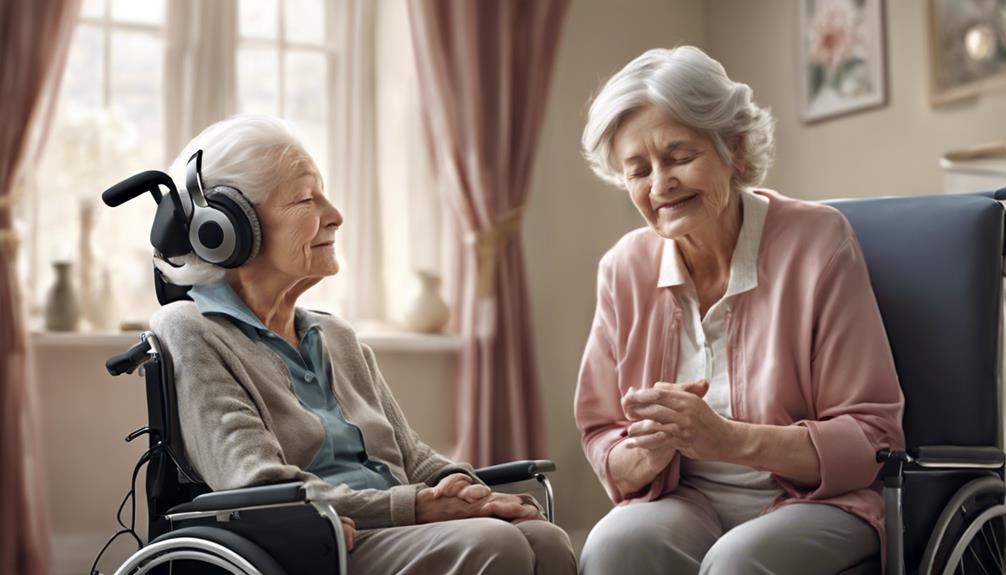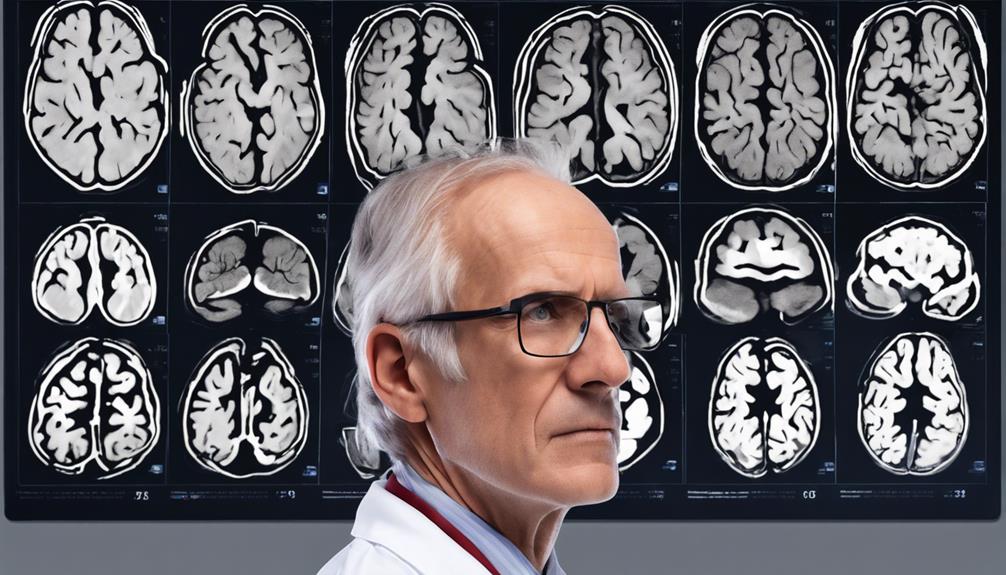In Episode 33 of Grace Meadows, we delve into how music therapy is a powerful tool for improving emotional well-being and memory recall in individuals with dementia. Music helps reduce agitation, connects with emotions, and aids in maintaining cognitive abilities. Customized playlists help create a familiar and comforting atmosphere, ultimately enhancing quality of life. Music has the ability to trigger emotional memories, soothe individuals, and stimulate cognitive processes. Regular incorporation of music promotes social interaction, reduces stress, and supports reminiscence therapy. Group activities play a significant role in boosting emotional well-being, in line with recommendations for social engagement. Grace Meadows showcases the profound impact of music on dementia care, providing valuable insights into enriching the lives of those with dementia.
Key Takeaways
- Episode 33 highlights music's power in dementia care.
- Music therapy reduces agitation and connects with emotions.
- Personalized playlists aid memory recall and evoke nostalgia.
- Music fosters social interactions and enhances cognitive abilities.
- Grace Meadows showcases innovative music therapy approaches for dementia.
The Role of Music Therapy
Music therapy emerges as a powerful non-pharmacological intervention, demonstrating effectiveness in reducing agitation and behavioral issues among individuals with dementia. When caring for someone with dementia, incorporating music therapy can be incredibly beneficial. Music has a unique way of reaching individuals, even those struggling with memory loss.
In dementia care, music therapy can help individuals connect with their emotions and memories, sparking moments of joy and comfort. Caregivers can create personalized playlists tailored to the individual's preferences, which can help in managing challenging behaviors and improving overall well-being. Music therapy also aids in establishing routines and cues for daily care, promoting engagement and participation.
Working alongside healthcare professionals to integrate music therapy into dementia care plans can enhance cognitive function and memory recall. By using music as a tool for connection, social interaction, and emotional support, individuals with dementia can experience improved quality of life and holistic well-being.
Benefits of Music in Dementia Care

Incorporating harmonious melodies into the daily routine of individuals with dementia can greatly enhance their cognitive function and memory recall. Music in dementia care offers numerous benefits for both patients and caregivers:
- Music reduces agitation and behavioral issues, promoting a sense of calm and well-being.
- It creates a familiar and comforting environment, encouraging social interactions and communication.
- Regular access to music helps maintain cognitive abilities and provides a source of comfort and familiarity.
- Caregivers play an important role in implementing music therapy by creating personalized playlists and using music to establish routines.
Musics Impact on Memory Recall
Music has a powerful impact on memory recall, especially in individuals with dementia. It triggers emotional memories that remain intact, aiding in recollection.
Listening to familiar music engages memory and emotion centers in the brain, supporting cognitive functions and enhancing memory recall.
Memory and Music Connection
Triggering emotional memories that are less affected by dementia, music has shown its remarkable ability to aid in memory recall. Music therapy can be a powerful tool in enhancing memory function for individuals living with dementia.
Here are some ways in which music can connect with memory and emotions:
- Music evokes nostalgic feelings, bringing back cherished memories.
- Melodies have the ability to calm and soothe individuals, reducing anxiety.
- Singing along to familiar tunes can spark joy and increase social interaction.
- Rhythms and beats can energize and stimulate cognitive processes, improving focus and attention.
Recall Enhancement Through Music
Engaging with familiar melodies can greatly enhance memory recall for individuals living with dementia. Music has a profound impact on memory recall, triggering emotional memories less affected by the condition. Musical experiences can improve cognitive performance and enhance memory retrieval in people with dementia.
Certain types of music engage brain regions responsible for memory and emotion, aiding in memory recall. Listening to familiar music stimulates memory pathways, improving the ability to recall past experiences in dementia patients. Musical memories are often retained longer in individuals with dementia, showcasing the powerful role of music in enhancing memory recall.
This connection between music therapy and cognitive enhancement highlights the importance of incorporating music into memory care programs for individuals living with dementia.
Music Therapy Benefits
Enhancing memory recall in individuals with dementia, music therapy has demonstrated significant benefits. Through personalized playlists and carefully selected music, memories thought to be lost can resurface, bringing joy and connection.
Here are four emotional benefits of music therapy for memory recall:
- Music evokes feelings of nostalgia, comfort, and happiness, fostering a sense of familiarity.
- Personalized playlists trigger specific memories, creating moments of clarity and recognition.
- Musical experiences stimulate cognitive function, improving overall mental well-being.
- Sharing music with loved ones promotes bonding and communication, enhancing relationships and emotional connections.
Incorporating Music in Daily Activities

In daily activities, incorporating music can provide a soothing and familiar atmosphere for individuals with dementia. Caregivers feel that integrating music into daily routines can greatly enhance the quality of life for people living with dementia.
Playing familiar tunes can encourage social interaction and communication among individuals with dementia, fostering a sense of connection and engagement. Music also supports reminiscence therapy, aiding in the recall of memories and boosting emotional well-being.
By including music in daily activities, caregivers can help improve the mood of individuals with dementia and reduce their stress levels. Using music as a cue for different tasks can provide structure and enhance engagement, making daily routines more manageable and enjoyable for those with dementia.
Caregivers play an essential role in incorporating music into daily activities, creating a supportive and enriching environment that benefits the overall well-being of individuals living with dementia.
Personalized Music Programs for Dementia

Personalized music programs for dementia individuals involve tailoring individualized playlists based on preferences and life history to trigger memories, emotions, and positive responses through familiar music. When implementing these programs, caregivers play a crucial role in ensuring the playlists are tailored to the specific needs and preferences of each individual.
Here are some key aspects to take into account when creating personalized music programs for dementia patients:
- Empathy: Understanding the individual's emotional state and selecting music that resonates with them.
- Patience: Allowing time for the music to have its effect and being present to observe the individual's reactions.
- Creativity: Finding unique ways to incorporate music into daily routines to enhance the individual's quality of life.
- Compassion: Showing kindness and understanding towards the challenges faced by dementia patients during the music program.
Music Therapy Techniques for Dementia Patients

Engaging individuals with dementia in music therapy techniques can greatly enhance cognitive function and memory retention. Personalized playlists tailored to the individual's preferences can evoke memories and emotions, stimulating brain activity. Caregivers play a vital role in implementing these techniques, using music to establish routines and cues for daily care. Grace Meadows emphasizes the significance of engaging individuals in music-based activities to improve cognitive abilities.
Music therapy techniques involve incorporating familiar music into routine activities, creating a comforting and recognizable environment for dementia patients. This can help reduce agitation and enhance mood, leading to a sense of familiarity and calmness. Caregivers can utilize music as a powerful tool to connect with individuals with dementia on a deeper level, fostering emotional well-being and improving overall quality of life. By integrating music into daily care routines, caregivers can positively impact the lives of dementia patients, creating moments of joy and connection through the power of music therapy.
Enhancing Emotional Well-Being Through Music

By tapping into the power of music's emotional triggers, we can greatly enhance the well-being of individuals with dementia. Music therapy techniques offer a unique way to improve emotional well-being in dementia patients.
Here are some ways in which music can positively impact their emotional state:
- Awakening Memories: Music has the ability to awaken deep emotional memories that may be less affected by dementia, evoking positive feelings and reducing distress.
- Diminishing Behavioral Symptoms: Listening to music can help decrease symptoms like depression and agitation, leading to a calmer and more emotionally stable state for individuals with dementia.
- Fostering Group Activities: Engaging in group music activities such as singing, as recommended by NICE guidelines, can create a sense of community and connection, boosting emotional well-being.
- Involving Memory and Emotion: Music activates brain regions responsible for memory and emotion, providing individuals with dementia a pathway to express themselves and connect with their feelings.
Through these strategies, music therapy can play a significant role in enhancing the emotional well-being of dementia patients.
Community Support and Music for Dementia

As advocates for individuals with dementia, our community stands united in recognizing the essential role of music in enhancing their quality of life. Grace Meadows' dedication to the Music for Dementia campaign exemplifies the power of community support in incorporating music into dementia care.
This campaign emphasizes the significance of regular access to music as a valuable aid for those with dementia. Music for Dementia provides affordable and accessible resources to raise awareness about the benefits of music in dementia care. Grace Meadows, serving as the Campaign Director, actively promotes the use of music therapy to enrich the lives of individuals with dementia.
Community engagement and support play crucial roles in implementing music-based activities and personalized care plans for those living with dementia. By joining together and embracing music for dementia, we can create a more supportive and enriching environment for individuals facing this condition.
Future Directions in Music Therapy for Dementia

As we look towards the future of music therapy for dementia, we'll explore innovative approaches, integrating technology into therapy sessions, and creating personalized playlists.
These advancements aim to enhance emotional connections, trigger positive memories, and provide tailored therapeutic experiences for individuals with dementia.
Innovative Music Therapy Approaches
Innovative music therapy approaches for dementia patients emphasize the creation of personalized playlists based on individual preferences, enhancing emotional well-being and cognitive function. When exploring ways to connect with individuals through music therapy, consider the following emotional aspects:
- Validation: Personalized playlists validate the individual's unique identity and life experiences.
- Comfort: Familiar songs can provide a sense of comfort and security, reducing anxiety and agitation.
- Empowerment: Involving dementia patients in selecting music empowers them to express themselves and make choices.
- Connection: Music facilitates connections with memories and emotions, fostering meaningful interactions and reducing feelings of isolation.
Technology Integration in Therapy
Exploring the integration of technology in music therapy for dementia patients showcases promising advancements in enhancing therapeutic interventions and improving quality of life.
Apps like Playlist for Life enable personalized playlists, while virtual reality programs use music to transport patients to familiar places.
Digital platforms such as Spotify and YouTube offer easy access to a wide range of music for therapy. Music therapy apps provide interactive experiences tailored to cognitive abilities and preferences of individuals with dementia.
Additionally, telehealth services are incorporating music therapy sessions to reach and support dementia patients remotely.
This integration of technology in music therapy holds great potential for enhancing the well-being and quality of life of individuals living with dementia.
Personalized Playlist Creation
Personalized playlist creation in music therapy for dementia patients offers a personalized and impactful approach to triggering memories and emotions unique to each individual's preferences. When designing personalized playlists for music therapy, consider the following:
- Connection to Past Experiences: Tailoring music selections to personal tastes helps individuals with dementia connect to their past experiences and identities.
- Enhanced Engagement: Customized playlists can enhance engagement and improve mood in dementia patients during therapy sessions.
- Behavioral Symptom Management: Individualized playlists offer a non-pharmacological approach to managing behavioral symptoms and promoting well-being in dementia patients.
- Emotional Connection: Music therapy using personalized playlists can foster a sense of familiarity, comfort, and emotional connection for individuals with dementia.
Frequently Asked Questions
How Does the Character Grace Meadows From Episode 33 of Grace Meadows Specifically Use Music in Her Daily Routine?
In our daily routines, music plays a significant role, just like Grace Meadows in Episode 33. She utilizes music to uplift her spirits, create a positive atmosphere, and enhance her overall well-being through its soothing melodies and rhythms.
What Specific Songs or Musical Genres Are Most Effective in Triggering Memories for Individuals With Dementia?
Like a gentle breeze on a summer day, certain songs can stir memories in individuals with dementia. The power lies in familiar tunes and genres that resonate with their past, offering solace and connection.
How Does the Show Portray the Challenges and Obstacles Faced When Trying to Incorporate Music Into the Daily Lives of Individuals With Dementia?
In our experience, incorporating music into the daily lives of individuals with dementia can be challenging due to varying responses and preferences. We endeavor to understand these obstacles and work creatively to overcome them.
Are There Any Specific Guidelines or Recommendations for Creating Personalized Music Programs for Individuals With Dementia Based on Their Musical Preferences?
When creating personalized music programs for individuals with dementia, it's crucial to take into account their musical preferences. We should tailor playlists to their tastes, focusing on familiar songs that evoke positive memories and emotions.
How Does the Episode Address the Potential Limitations or Barriers to Implementing Music Therapy Techniques for Individuals With Dementia in Real-Life Settings?
When addressing limitations in implementing music therapy for individuals with dementia, we find the episode enlightening. It shares insights on maneuvering obstacles like communication challenges, lack of resources, and resistance, encouraging perseverance and creative solutions.
Conclusion
To sum up, just like the characters in Episode 33 of Grace Meadows, we've learned that music can play a significant role in enhancing the well-being of individuals with dementia.
By incorporating personalized music programs, utilizing music therapy techniques, and fostering community support, we can make a positive impact on their emotional state and memory recall.
Let's continue to explore the power of music in dementia care and aim to create meaningful connections through the universal language of music.









